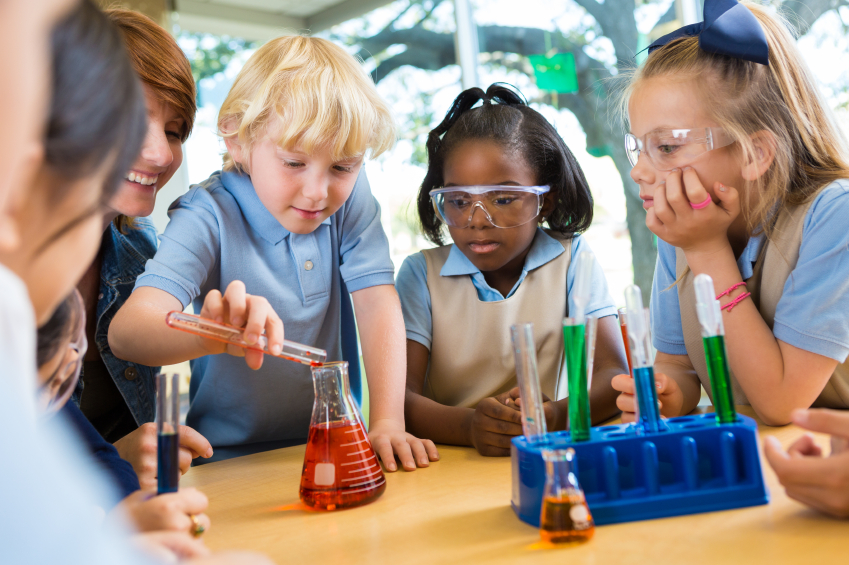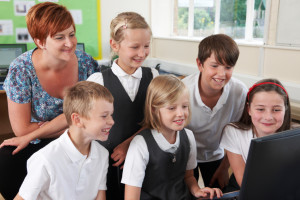
Students learn and achieve in both public and private schools. Both environments are funded – either by public funding or private financing. Both have qualified teachers. So why would parents choose to send their children to one or the other? Why would they agree to pay more to put their children into private or parochial schools?
There are several reasons why parents choose this option, ranging from school philosophy to programming to issues like safety and character development. Here are some of the most popular stated reasons why parents choose the private alternative.
Academic Excellence
In many communities, private schools have over the years established reputations for academic excellence, preparing students for post-secondary education and professional careers. Studies have shown that students in private high schools in many areas reflect higher graduation rates and higher college admission test scores than those in public schools. The academic emphasis in private schools is supported by the organizational structures, staff, rules and discipline that put academics first.
Controlled Class Sizes
Many parents believe that class size has a lot to do with their children’s chance of success in school. They see smaller class size as an opportunity for more personal attention and fewer distractions. Smaller class sizes give teachers more time with each student, making sure they understand material, and can give them more support if needed. Some research shows private schools have student-teacher ratios at 13:1 or lower compared with public school ratios of 16:1. Other research claims smaller class sizes lead to better than average performance on achievement tests.
Smaller class sizes allow teachers to spend more time with students on every aspect of education, including personal counseling. A Massachusetts study found that its public schools provided one counselor for every 415 students vs. one counselor for every five students in private schools. The study showed that many private school counselors also worked in college administrative offices which provided more valuable information and guidance for college-bound students.
Emphasis on Discipline
Character development is extremely important for most parents. They send their children to school to learn and grow, both academically and socially. They want their children to learn responsibility and how to interact with others in a fair and acceptable way.
Private schools differ from public schools in the way they structure their learning environments. Public schools are governed by constitutional law while private schools use contractual law. That means that, while all public school students are treated according to traditional law, private school students are subject to whatever contract the school draws up and is agreed to by students.
Students are asked to read, understand and agree with the terms of the school contract before they are enrolled in the school. They have to agree to the code of conduct. Many schools have zero tolerance policies for offenses like cheating, stealing, or substance abuse. Unlike public schools, violations of these policies can lead to expulsion.
The code of conduct regulates all school behavior. It is a contract among students, teachers and parents. It specifies the discipline resulting from misbehavior and deviance from the rules. The code is used to teach responsibility, trust and self-respect as well as respect for teachers and other students. It fosters principles like truth and honesty in all school activities and behavior. It becomes a leadership tool.
Higher Standards
Academic coursework is typically more challenging in private schools and graduation requirements are stricter. Studies by the U.S. Department of Education have shown that private schools require more years of math and foreign languages than public schools. They also require four times more community service than public schools as a requisite to graduation.
School Safety
Secretary of Education, Arne Duncan said “Children cannot get a quality education if they don’t first feel safe at school.” Federal reports have indicated that students do feel safer in private schools. In studying crimes at school, the reports summarized that students at public schools were four times more likely to report being victims of such crimes as theft, robbery (including the threat or use of force) and sexual assault.
Many parents feel that their children are safer in private schools. They feel a stronger sense of community and one which actively discourages dangerous behavior. They feel that this safety improves the quality of education and improves their children’s ability to focus on learning and personal development.
Fewer Conflicts and Less Bullying
The National Center for Educational Statistics (NCES) studied school problems like bullying, conflicts among students, and acts of disrespect toward teachers. The study showed that public schools were four time more likely to report these issues than private schools. Educational professionals say a safe school is one that has a culture of respect and caring. Students do not disrupt classes, wander hallways, spend time texting other students, bully others, or curse or threaten teachers. Many professionals and parents feel that independent schools like private and parochial ones are better suited to provide this kind of safe environment.
Gifted and Talented Programs
Many parents choose private schools for the special academic, skill, or religious opportunities that they offer. Some schools may emphasize a certain language like French, Spanish, Mandarin or Russian. Some focus on one religion and single sex education. Other schools offer more opportunities in music, art or sports.
Some schools provide more challenging educational opportunities like Advanced Placement (AP) programs, international programs or gifted and talented programs.
Private schools are also known for providing many extracurricular choices like clubs and group activities centered on particular interests. One study at Stanford University found that students who were involved in the arts were more interested in school in general and more likely to have high attendance.
A Family Environment
Private schools encourage community involvement and invite students, parents, teachers, administration, and area volunteers to join together in common support. Activities can include parent-teacher organizations and meetings, parent breakfasts or luncheons, camping trips, dances or social gatherings, fundraising events, sporting events, religious, or other family-oriented themes.
Teachers share this feeling of family are often dedicated beyond their commitment to teaching courses. They want to see students succeed in life as well as academics. Teacher dedication is one of the biggest reasons parents choose private schools. Parents see teachers as passionate about values and view them as potential role models for their children.
Students and alumni of private schools establish relationships that go on for many years, even a lifetime. Alumni feel a sense of pride and are often involved in supporting the school they graduated from. Their sense of commitment is strong, especially for those who attended schools of faith but for others, too.
Students do learn in both public and private schools. But many parents choose private schools because they perceive a warmer, safer, more structured, and more opportunistic environment for their children.




